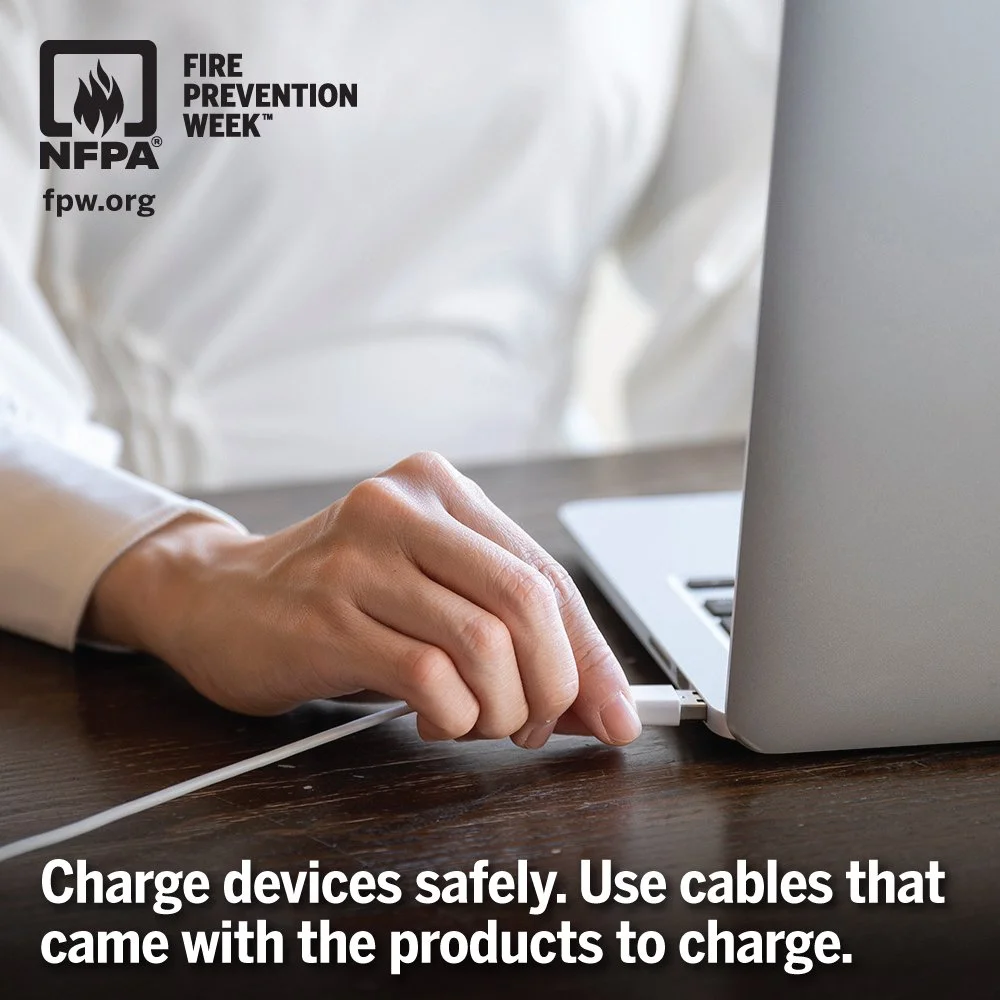Fire Prevention Week 2025: Safe Charging for Electronic Devices in Schools, Hospitals, and Businesses
Fire Prevention Week, set for October 5-11, 2025, is a critical time to focus on fire safety, especially with this year’s theme, “Charge into Fire Safety™: Lithium-Ion Batteries in Your Home,” as announced by the National Fire Protection Association (NFPA). While the theme emphasizes residential safety, the principles of safe lithium-ion battery use are equally vital in schools, hospitals, and businesses, where these batteries power everything from laptops to medical devices and e-bikes. Improper handling can lead to devastating fires, putting lives and operations at risk. Here’s how these industries can adopt NFPA’s guidelines to ensure safety during Fire Prevention Week and beyond.
The Growing Risk of Lithium-Ion Battery Fires
Lithium-ion batteries are ubiquitous, powering smartphones, tablets, power tools, and e-bikes. However, as the NFPA notes, these batteries can overheat, catch fire, or explode if damaged, improperly charged, or mishandled. The 2025 Fire Prevention Week campaign highlights the rising number of fires linked to these devices, with a focus on three key actions: buying certified products, charging safely, and recycling responsibly. Schools, hospitals, and businesses, with their heavy reliance on technology, face unique challenges in managing these risks due to high device usage, complex environments, and vulnerable populations.
Safe Charging in Schools
Schools are hubs for electronic devices, from student laptops and tablets to staff smartphones and e-bikes used for campus mobility. The NFPA emphasizes buying products with a safety certification mark (e.g., UL, ETL, or CSA) to ensure compliance with established standards. In schools, IT departments should verify that devices meet these standards, as uncertified products sold online or in stores may increase fire risks.
Safe charging is critical in educational settings. The NFPA advises using manufacturer-provided cables, charging on hard surfaces, and avoiding overcharging. Schools should designate charging stations away from flammable materials, such as paper or furniture, and ensure devices are unplugged once fully charged. For example, charging carts for tablets should be placed in well-ventilated areas and monitored to prevent overheating. Regular staff training on NFPA 72-compliant fire alarm systems, like Siemens Cerberus PRO, can ensure early detection and rapid response, protecting students and staff.
Recycling is another key focus. Schools should partner with certified recycling programs, such as those listed at call2recycle.org, to safely dispose of old batteries, preventing fires in waste systems. Fire drills and mobility assessments, as recommended by the NFPA, are essential to prepare for evacuations, especially for younger students or those with disabilities.
The NFPA has also prepared downloadable fire safety resources for schools, educators, and families to help prepare students for fire safety both in and out of the classroom.
Protecting Hospitals with Safe Charging Practices
Hospitals rely on lithium-ion batteries for critical equipment like infusion pumps, portable monitors, and staff communication devices. A fire caused by a faulty battery could disrupt patient care and endanger lives. The NFPA’s advice to buy listed products is crucial here—hospitals must ensure medical devices carry safety certifications to reduce risks. Biomedical teams should conduct regular audits to verify compliance.
Safe charging in hospitals requires strict protocols. Charging stations for devices like Rauland Responder 5 nurse call handsets should be on hard surfaces in designated areas, away from patient beds or oxygen-rich environments. Overcharging must be avoided, and staff should be trained to use original cables and follow manufacturer guidelines. Integrating fire alarms with nurse call systems, as offered by Communication Company, ensures alerts reach staff instantly, enabling swift action.
Responsible recycling is vital in healthcare. Hospitals generate significant battery waste from medical devices, and improper disposal can spark fires. Partnering with certified recyclers ensures compliance with NFPA recommendations and protects the facility. Regular inspections under NFPA 72, supported by services like ComCare Managed Services, keep fire systems reliable, minimizing downtime in critical healthcare settings.
Ensuring Business Safety Through Battery Management
Businesses, from offices to industrial facilities, use lithium-ion batteries in laptops, power tools, and electric vehicles. The NFPA’s focus on certified products applies here—procurement teams should prioritize devices with UL, ETL, or CSA marks to avoid fire hazards from substandard equipment. This is especially critical in warehouses or manufacturing plants where high device density increases risks.
Safe charging practices are essential in business environments. Employees should charge devices on hard surfaces, away from combustible materials, and avoid leaving devices plugged in overnight. Businesses can install monitored charging stations and integrate them with Siemens fire alarm systems for early detection. Regular fire drills and clear egress paths, as per NFPA guidelines, ensure safe evacuations, particularly in large office buildings or factories.
Recycling responsibly is a must for businesses with high device turnover. The NFPA recommends using certified recycling locations to prevent battery-related fires in waste streams. Services like ComCare Select, offering 24/7 monitoring and annual inspections, help businesses maintain NFPA 72 compliance, reducing risks and ensuring operational continuity.
Fire Prevention Week: A Call to Action
Fire Prevention Week 2025, running October 5-11, is an opportunity for schools, hospitals, and businesses to reassess their fire safety protocols, particularly around lithium-ion battery use. The NFPA’s theme, “Charge into Fire Safety™,” reminds us that small steps—buying certified products, charging safely, and recycling responsibly—can prevent devastating fires. By adopting these practices and leveraging advanced systems like Siemens fire alarms and Rauland communication platforms, organizations can protect lives and assets.
Communication Company is here to help. Our tailored solutions and ComCare Managed Services ensure your fire safety systems are NFPA-compliant and reliable. Visit our Fire Safety page or contact us to learn how we can support your safety goals. Let’s make Fire Prevention Week a catalyst for safer environments.
